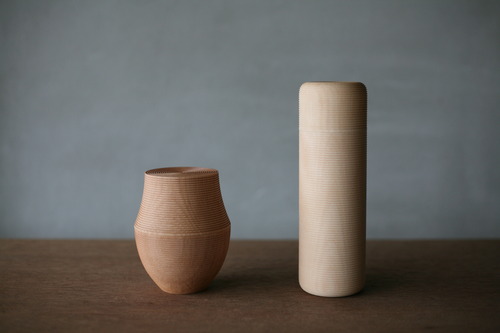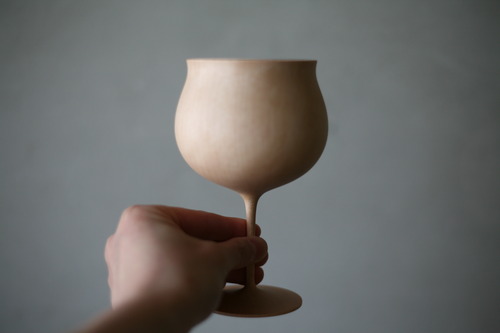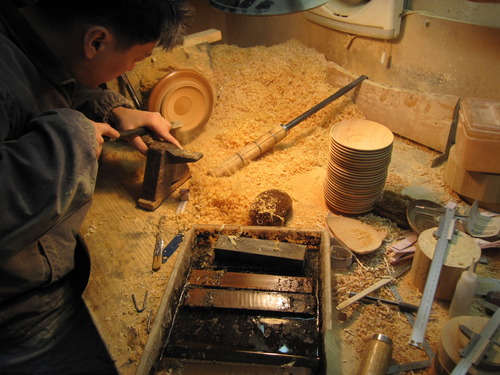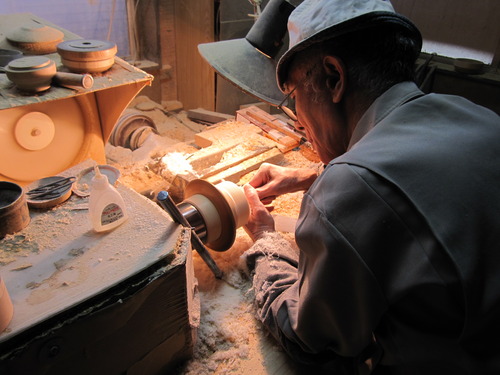



[Yamanaka Lacquerware]
Yamanaka lacquerware is the generic name for lacquerware made in the Yamanaka Onsen area of Kaga City, Ishikawa Prefecture. Gato Mikio Shoten was founded in 1908 as Gato Mokkojo (Woodworks). Inheriting the philosophy of a woodworker, the company has been manufacturing lacquerware with a focus on the perfection of the wood, the base of the lacquerware.
The foundation of Yamanaka lacquerware is the perfection of the wood. Yamanaka lacquerware's wipe lacquer finish, which is a thin coating of lacquer, is a finishing method that requires a good wood base in order to produce a product.
Such thinly lacquered lacquerware is recognized as inexpensive in the market, but the truth is that only Yamanaka lacquerware can produce this type of lacquerware. In contrast to staid lacquerware with thick layers of lacquer, Yamanaka lacquerware is characterized by a healthy and casual style that makes the most of the materials. This can only be done with the skillful technique of a craftsman.
This characteristic is also reflected in the tea canisters named "Karmi"; Karmi Tea Canisters are named after one of the haikai principles of the Edo period haiku poet Matsuo Basho, "Karumi (lightness)." It expresses the light-heartedness felt in everyday life without elaborating on knowledge or technique, and is connected to the philosophy of beautiful design that seems to exude from the inside.
Lacquerware tends to focus on the luxurious aspects of the exterior, such as maki-e, chinkin, and overglaze coating, but the most important part is the original wooden base. For the time being, Gato Mikio Shoten continues to produce products while maintaining the concept of fully emphasizing Yamanaka's rokuro techniques.
Gato Mikio Shoten’s Karmi Tea Canisters for Tea 100g Soji
https://www.shokunin.com/en/gato/karmi.html[Yamanaka Lacquerware]
Yamanaka lacquerware is the generic name for lacquerware made in the Yamanaka Onsen area of Kaga City, Ishikawa Prefecture. Gato Mikio Shoten was founded in 1908 as Gado Mokkojo (Woodworks). Inheriting the philosophy of a woodworker, the company has been manufacturing lacquerware with a focus on the perfection of the wood, the base of the lacquerware.
The foundation of Yamanaka lacquerware is the perfection of the wood. Yamanaka lacquerware's wipe lacquer finish, which is a thin coating of lacquer, is a finishing method that requires a good wood base in order to produce a product.
Such thinly lacquered lacquerware is recognized as inexpensive in the market, but the truth is that only Yamanaka lacquerware can produce this type of lacquerware. In contrast to staid lacquerware with thick layers of lacquer, Yamanaka lacquerware is characterized by a healthy and casual style that makes the most of the materials. This can only be done with the skillful technique of a craftsman.
This characteristic is also reflected in the tea canisters named "Karmi"; Karmi Tea Canisters are named after one of the haikai principles of the Edo period haiku poet Matsuo Basho, "Karumi (lightness)." It expresses the light-heartedness felt in everyday life without elaborating on knowledge or technique, and is connected to the philosophy of beautiful design that seems to exude from the inside.
Lacquerware tends to focus on the luxurious aspects of the exterior, such as maki-e, chinkin, and overglaze coating, but the most important part is the original wooden base. For the time being, Gato Mikio Shoten continues to produce products while maintaining the concept of fully emphasizing Yamanaka's rokuro techniques.
Gato Mikio Shoten’s Karmi Tea Canisters
https://www.shokunin.com/en/gato/karmi.html
Gato Mikio Shoten's Tohka Wine
https://www.shokunin.com/en/gato/tohka.html